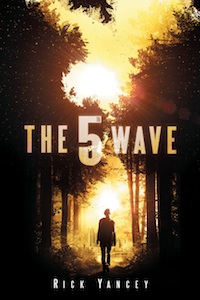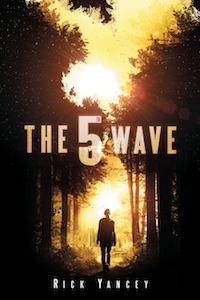R
When aliens invade earth, their presence is felt in waves: Lights Out, Surf’s Up, Pestilence, Silencer, and the Fifth Wave. After losing the power grid and facing pestilence, most humans lose trust and hope. Their enormous pressure to follow the herd and their ignorance of a fifth column leads to their undoing. But sixteen-year-old Cassie Sullivan, a resident of Ohio, resists this pressure and doesn’t allow fear or ignorance to paralyze her. Cassie now lives in an either-or world: either you stay and die or run and die. Initially, Cassie runs, but eventually she learns to stop running. She chooses to face the things she thought she could not face: death, loss, fear, and the idea that she may be the last human left on earth. A survivor of the first four alien infiltrations Cassie is one of the strong, “bent but unbroken” (128). Scared, angry, confused, and fighting to survive, Cassie is determined to keep her promise to her brother, Sammy that she will come for him. Despite her secret weapon—hope, the obstacles to that promise stack up when Cassie finds herself alone and eventually face-to-face with a finisher, a Silencer whose sole purpose is to snuff out the human noise.
Another survivor is Benjamin Parish, a young man with “off the charts” potential. Although Ben wonders if it is better to die than to live, better to give up than to fight, better to hide than to face the truth of the new and alien world order, he decides to take a stand; he will be Colonel Vosch’s human clay: “I am the master builder, and you will be my masterpiece” (130), vows Vosch, who teaches Ben to love death. Renaming him Zombie, Vosch empties Ben of grief and guilt and self-pity and fills him with hate and cunning and the spirit of vengeance. Despite being “corrupted by the lies of an enemy who knows how he thinks, who twists everything good in him to evil, who uses his hope and trust to turn him into a weapon against his own kind” (318), Ben comes to recognize that promises matter.
While the book is replete with violence, action, thrills, and chills, it holds multiple redeeming lessons about human psychology and life:
- “Even the most sensitive person can get used to even the most insensitive thing (138). . . .“Like anything omnipresent—you get used to it . . . after a while” (232).
- “Cruelty isn’t a personality trait. Cruelty is a habit” (138).
- “A well-adjusted healthy human psyche [is] the hardest to overcome” (140).
- “[Life] is not about the time we’re here, but what we do with the time” (178).
- “There’s an old saying about the truth setting you free. Don’t buy it. Sometimes the truth slams the cell door shut and throws a thousand bolts” (310).
Perhaps the largest lesson I learned from Yancey’s exploration into the kindness and cruelty of humankind as he forces ordinary people into extraordinary circumstances is that we must respect the humanity of all humans, even when society fails to do so. As Yancey writes, “The minute we decide that one person doesn’t matter anymore, they’ve won. . . . One, even the smallest, weakest, most insignificant one, matters” (455). Even in the most trying of times, Yancey encourages us to value hope, perseverance, and humanity.
- Posted by Donna

